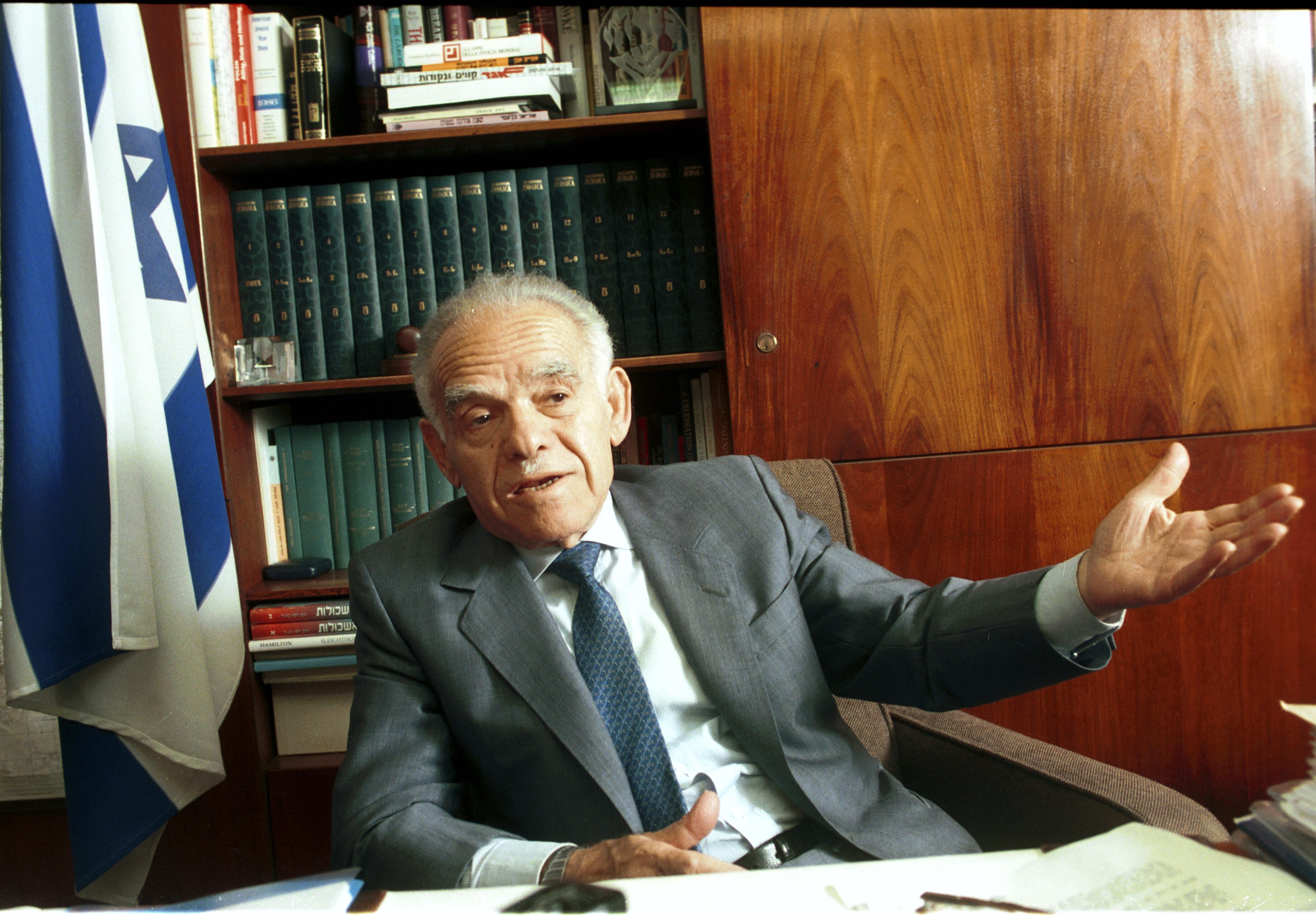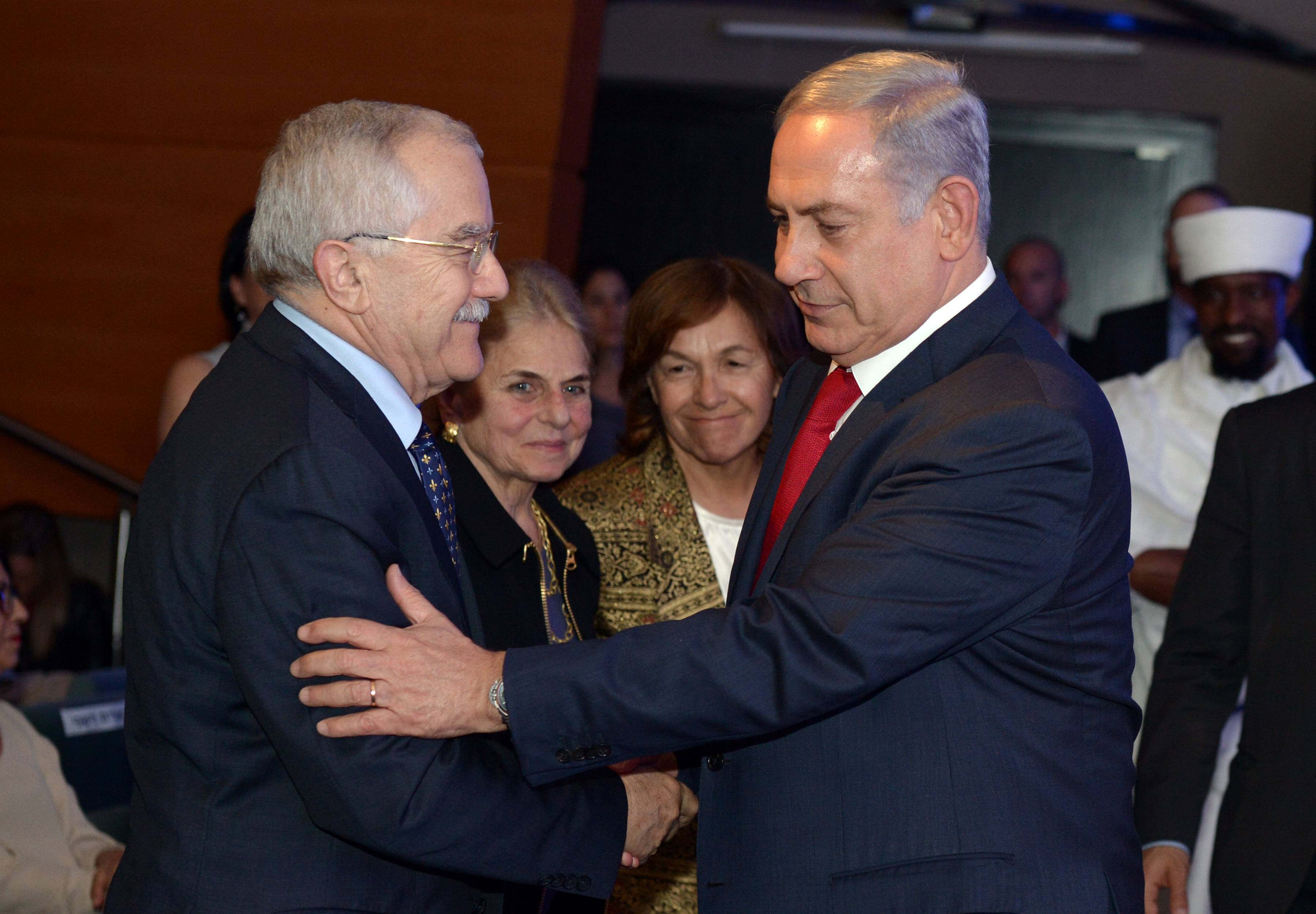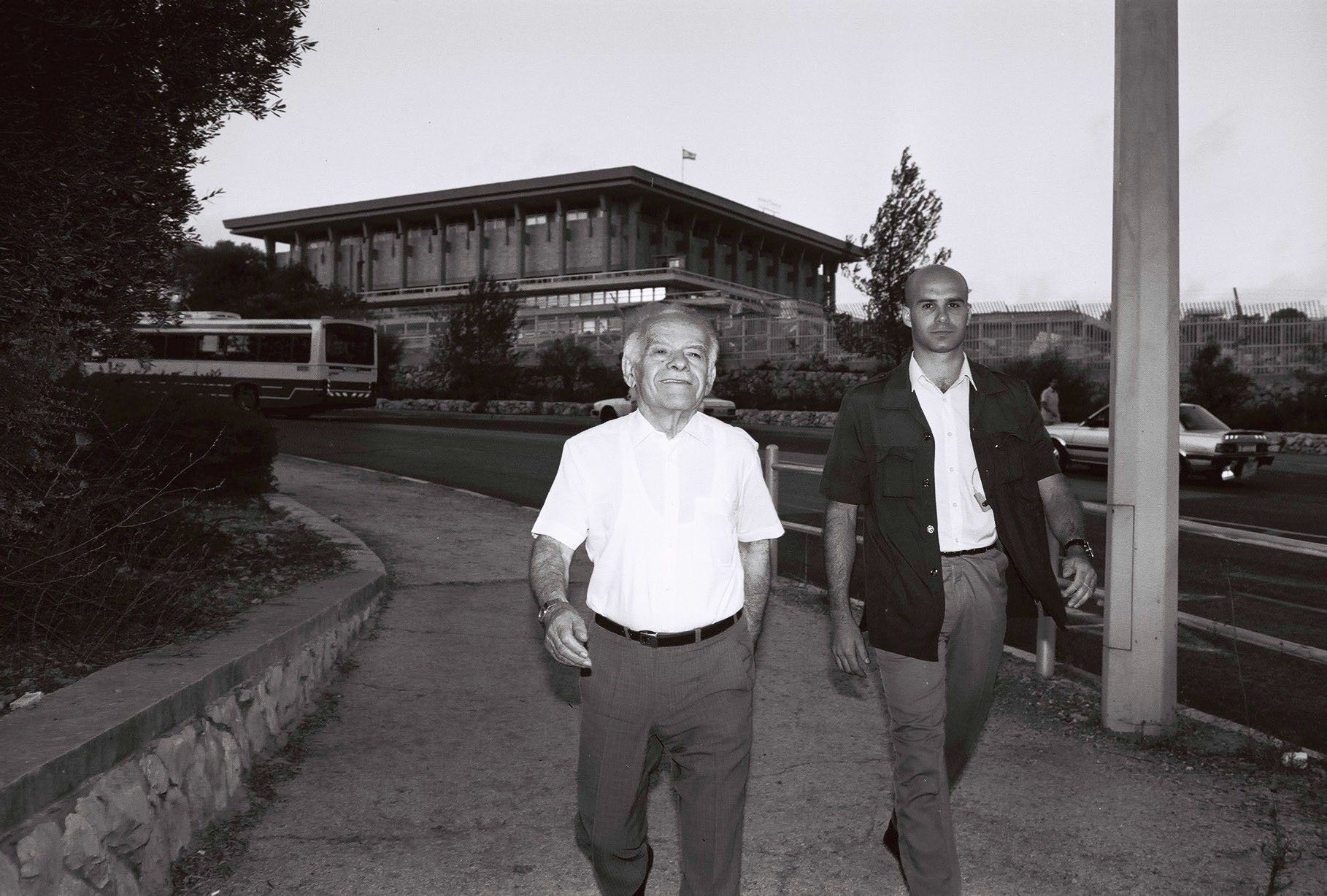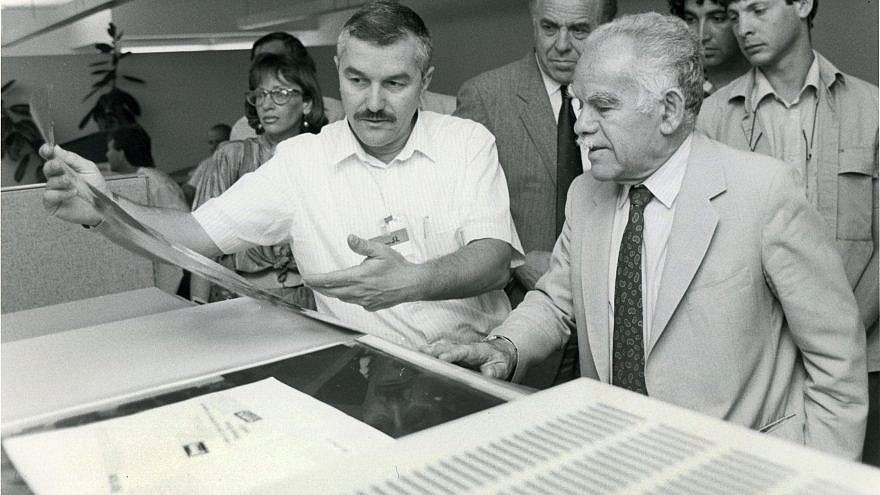Acting Israeli Foreign Minister Yisrael Katz caused an uproar last week during an interview with Israeli TV, when he quoted former Israeli Prime Minister Yitzchak Shamir as having said, “the Poles suckle anti-Semitism with their mother’s milk.” As a result, Poland and Czechoslovakia cancelled their participation in a meeting of European Union members in Israel that was to have been taking place the following day. Ultimately, the meeting was cancelled all together.
In an exclusive interview in Tel Aviv with JNS, Yair Shamir, 73, a former agriculture minister who also served as chairman of El Al Airlines and of Israel Aerospace Industries, spoke of his father’s remarks about the Poles and why Katz’s statement was out of place. He also expressed trepidation about Israeli Prime Minister Benjamin Netanyahu’s performance and revealed things about his father that were never disclosed.

So you can understand why my father spoke in such a way about the Poles. However, Katz missed the context in which he said it. There was Yitzchak Shamir the private citizen and then there was Yitzchak Shamir the Foreign Minister or the prime minister representing the State of Israel. As a private citizen, he would say things like “the Poles suckle anti-Semitism with their mothers’ milk” or “my foot will never step on Polish soil.” He would never even speak their language. As far as he personally was concerned, he was “finished with them.”
Then there was Yitzchak Shamir the Foreign Minister. As such, he realized that Poland was an important country, and it was imperative to forge good diplomatic relations with it; therefore, he would contain his emotions. Katz did not make that differentiation and caused an outcry.
Q: What is your take on the upcoming elections in Israel? Is there a threat to Netanyahu’s leadership?
YS: This election will be interesting. The small parties will dissipate. Only two blocs will remain, and the people will have to choose either here or there; there’s no ambiguity. I think in the end, Bibi [Netanyahu] will take the election, but if he would not have run at all, the Likud would take the election without any doubt. People are fed up with Bibi.

On the one hand, Bibi is showing more maturity than before; he is taking more risks and is doing things that he didn’t do before like developing ties with the Arab world. And he is trying to get more votes for the Likud by steering the Likud more to the center of the political spectrum than to the right. But as far as the “grand plan” for Israel is concerned, I see an erosion; I don’t see him showing any strength in that area.
Q: If, as you say, he is developing ties with the Arab world, where do you see an erosion? What grand plan are you talking about?
YS: I mean in the area of Eretz Israel. He is ready to make territorial concessions because when he meets with Arab leaders, what can he offer them besides territory? Of course, there’s the common enemy that brings Bibi together with the Arab world: Iran. But, in the end, at some stage, they will demand more Israeli concessions in exchange for any relations
Q. One can say the same thing about your father when he went to meet with the Arab world in Madrid?
YS: When he went to Madrid, my father made a condition loud and clear that he is going only to negotiate peace for peace, but if you want to negotiate land for peace, then forget about it. “I’m not coming,” he said. Bibi is not saying that.
Another thing, Bibi never retracted his speech that he made at Bar-Ilan University in favor of a two-state solution, nor did he cancel the Oslo accords. He remains ambiguous about these issues.
Q: Is that why he is not promoting settlement activity in Judea and Samaria?
YS: I think he knows details of Trump’s peace plan, that it will demand territorial concessions there. He is interested in that plan being delayed as much as possible. Therefore, he feels that any action in Judea and Samaria will accelerate the announcement of the peace plan. He is very careful and never took concrete action to promote settlement activity in Judea and Samaria.
I think this reflects his true opinion, as stated in his speech at Bar-Ilan; therefore, he is leaving all the doors open in Judea and Samaria. That’s not good. On the one hand, the Jewish population is growing there, and at the same time, the security situation has weakened there. The Arabs have become more brazen because they feel the world has their back. In Gaza, the situation is worse than in Judea and Samaria because in Judea and Samaria they know that the IDF will enter whenever they want. In Gaza, however, they use civilians as human shields, so it is much more difficult. They know how to play with human lives very well.
Q: Have you missed being out of politics?
YS: Not at all, and I have no desire to return. There is no one to talk to; there is no common ground; it’s all about extreme egotism and personal interests. There is no ideology, no vision, no goal. When I joined Yisrael Beiteinu, I thought I could make a difference, and although I did make some changes, they were minor. In order to make a significant change, you have to have partners, and I don’t feel there are partners there today.
In my opinion, the only one in the Knesset today that is ideologically inclined and doesn’t have only personal interests in mind is Ayelet Shaked. She has proven to be a very capable, clever and eloquent politician with integrity. If she were in Likud, she would be a real threat to Bibi. By the way, after I was sworn in as agriculture minister six years ago, she came over to me and after introducing herself said that she entered politics because of my father. She said that when she was an elementary student in the eighth grade, my father once came to speak before her class. She was so impressed and taken by his integrity, honesty and conviction that when she came home that day after school, she told her parents: “I want to be a politician like Yitzchak Shamir when I grow up.”
Q: Do you think your colleague Avigdor Lieberman was qualified to be defense minister, and should he have resigned as he did?
YS: At first, I thought he was qualified, but after watching him perform, I realized that I was wrong. He was a disappointment; he could have done more if he wanted. A defense minister of Israel is supposed to transcend petty politics. When a defense minister of Israel resigns, it should cause an “earthquake,” not be viewed as a political move. But it passed without any outcry, as if it were a minor minister who resigns for political reasons. Defense is Israel’s lifeline. His resignation was met with total apathy because he didn’t do anything during the time he was on the job, and so the people felt that nothing was lost by his resignation.
Q: Uri Ariel succeeded you in the agricultural ministry. Has he made any significant changes?
YS: I hear there is more infighting in the office since I left. That weakens the ministry significantly, and as a result, the agricultural industry in Israel is in retreat.
Q: Much has been written about your father in the course of the years. Can you tell us something about him that was not mentioned?
YS: I can tell you something personal in how he related to me that was not written anywhere. When I was training in the air force, I wrote him a letter that I was working to become an officer. (At that time, my father was working for the Mossad in Europe). He wrote me back: “If you are going to lead others, always remember the biblical verse, Tzedek tzedek tirdof (“Righteousness, righteousness shall you pursue”). At that time, I thought that he was telling me to be honest and act fairly with those under my command. Once, when I was older, I asked him why does it say tzedek twice? He replied “Go study.” That was his standard reply whenever I would ask him something: “Go and find out for yourself.” I searched and found that the first tzedek is to judge according to the law. The second is to have mercy—to take into account the circumstances facing the person in front of you and not to judge him only according to the law.
Another thing people don’t know about my father is that he loved chazzanut (cantorial music). He could sit and listen to it for hours. Over the weekend, there would be a two-hour radio program of chazzanut; we knew during that time that we couldn’t interrupt him.
Q: Did he have a favorite chazzan (“cantor”)?
YS: Yes, Cantor Shmuel Malavsky and family. I love chazzanut and opera, too. I also have all the albums of Chassidic singers like Mordechai Ben David, Yaakov Shweky, Avraham Fried. My favorite is Avraham Fried. Whenever I’m depressed, I’ll listen to songs by Avraham Fried.
Q: When they asked your father to succeed Menachem Begin, did it come as a surprise to your family?
YS: Look, Begin stopped functioning quite a long time before he resigned. My father was foreign minister, and Ariel Sharon was defense minister. Sharon tried to implement all kinds of moves that he would dare have tried when Begin was strong. But now Begin was weak and could not interfere and Sharon posed a problem. Finally, Begin announced he can’t lead anymore and a struggle for the leadership ensued between my father and David Levy. Although my father was not the type to fight for leadership but he felt that for the sake of the country he has to prevent Levy from taking charge, he felt Levy was not qualified to be prime minister.

Q: How did your father view Sadat coming to Jerusalem and the Camp David accords?
YS: Generally, he supported forging ties with Egypt, which at that time was the biggest Arab country. What bothered him most was the price Israel had to pay for it—that we agreed to uproot settlements. He was adamantly opposed to that because he felt that was a precedent and would repeat itself later. I asked him why when the vote for the peace deal with Egypt came up, he abstained. He said the clause in the agreement about uprooting settlements bothered him very much.
Q: Why abstain and not vote against it?
YS: I imagine because he was Speaker of the House and didn’t want to embarrass Begin. The deal would have passed anyway with an overwhelming majority, even if my father would have voted against it.
Q: At first, your father was reluctant to attend the Madrid peace conference in 1991, but in the end he did attend. What made him change his mind?
YS: There was tremendous pressure from the United States, and there were very hard and intense negotiations beforehand. In the end, all of my father’s conditions were met. Land for peace was not on the agenda. There was no independent representation of the PLO; they came as part of the Jordanian delegation. All the Arab states attended
There is another condition that was never made known; I myself heard it from somebody else, not from my father. My father never spoke of it with us. He made a condition that an amount of Jewish families should be allowed to leave Syria and unite with their families in Israel. That condition was met as well.
Q: Finally, what was it like being the son of the prime minister?
YS: Well, when my father became prime minister, I was 37 years old, I had already been a military officer, so it wasn’t such a big deal as if would be for a kid whose father became prime minister.


























